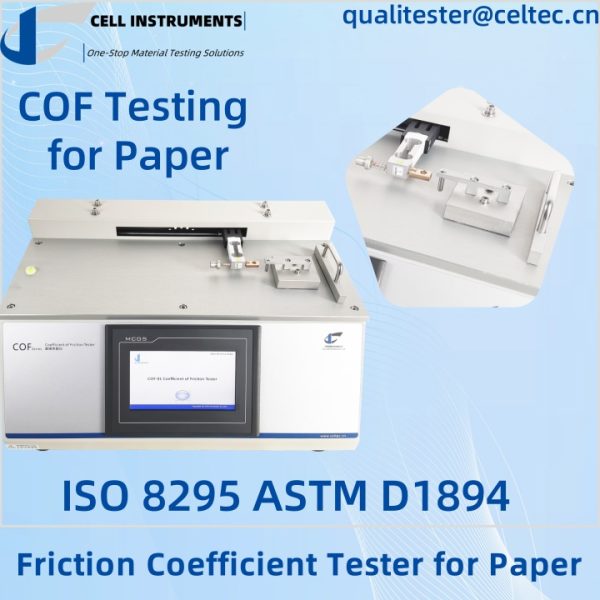The Importance of Using a Friction Coefficient Tester for Paper in Quality Control
Introduction
The coefficient of friction (CoF) is a critical parameter in material testing, especially for paper products. It quantifies the resistance encountered when two surfaces slide against each other. Accurate CoF measurements are crucial for ensuring the quality, safety, and performance of paper in various applications. This article explores the importance of using a friction coefficient tester for paper, referencing ASTM D1894 and ISO 8295 standards.
Understanding COF Testing for Paper
COF testing involves measuring the frictional forces between two surfaces, divided into static friction (the force required to initiate movement) and kinetic friction (the force required to maintain movement). Proper sample preparation and conditioning are essential for accurate and repeatable results.
Why COF Testing Matters
- Quality Assurance: Ensures paper products meet industry standards.
- Performance Optimization: Helps in understanding material behavior under different conditions.
- Regulatory Compliance: Meets the requirements set by standards like ASTM D1894 and ISO 8295.
Key Standards in COF Testing
ASTM D1894
ASTM D1894 is a widely recognized standard for measuring the CoF of plastic film and sheeting, applicable to paper as well. It provides a consistent methodology to ensure comparability of results across different laboratories and industries.
- Sample Preparation: Cut samples into strips and condition them as specified.
- Test Setup: Place the film on a horizontal plane while a sled is pulled across it at a constant speed.
- Measurements: Record the forces required to initiate and maintain movement.
ISO 8295
ISO 8295 is an international standard for determining the CoF of plastic films and sheeting, ensuring uniform testing procedures and results consistency on a global scale.
- Sample Preparation: Similar to ASTM D1894, with samples prepared and conditioned.
- Test Setup: Place the sample on a flat surface, and pull a sled with a specified weight across it at a constant speed.
- Measurements: Measure static and kinetic friction forces to calculate the CoF.
Utilizing Cell Instruments Friction Coefficient Tester
At Cell Instruments, we offer state-of-the-art Coefficient of Friction Testing Equipment designed for precision, reliability, and versatility. Our equipment ensures consistent and accurate results for a wide range of materials and testing scenarios.
Key Features and Benefits:
- High Precision: Delivers precise CoF measurements with minimal variability.
- User-Friendly Interface: Easy-to-use controls and intuitive software.
- Customization Options: Tailored solutions to meet specific testing requirements.
- Robust Design: Built for durability with minimal maintenance.
Applications and Industry Use Cases
Packaging Materials
In the packaging industry, CoF testing is crucial to ensure materials do not stick together excessively or slide apart too easily, affecting the integrity and usability of packaging.
Medical and Pharmaceutical
For medical devices and pharmaceutical packaging, controlling the CoF is vital to ensure safety, functionality, and compliance with regulatory standards.
Textiles and Adhesives
In textiles, the CoF affects fabric hand feel and performance. For adhesives, it determines bonding strength and ease of application.
Conclusion
Accurate CoF testing is essential for maintaining the quality and performance of paper products. By adhering to standards like ASTM D1894 and ISO 8295, manufacturers can ensure consistent and reliable results. The Cell Instruments Friction Coefficient Tester offers the precision and versatility needed to meet these standards, making it an invaluable tool in quality control.
FAQ
1. What is the coefficient of friction (CoF)?
- The coefficient of friction (CoF) quantifies the resistance encountered when two surfaces slide against each other, crucial for ensuring the quality and performance of materials.
2. Why is COF testing important for paper?
- COF testing for paper ensures that products meet industry standards, perform optimally, and comply with regulatory requirements.
3. What are ASTM D1894 and ISO 8295 standards?
- ASTM D1894 and ISO 8295 are standards that provide consistent methodologies for measuring the CoF of plastic films, sheeting, and paper.
4. How does Cell Instruments’ Friction Coefficient Tester work?
- Cell Instruments’ Friction Coefficient Tester measures static and kinetic friction forces between surfaces, offering high precision, customization options, and user-friendly operation.
5. What industries benefit from COF testing for paper?
- Industries such as packaging, medical and pharmaceutical, textiles, and adhesives benefit from COF testing to ensure material quality and performance.
Related Products
Coefficient of Friction Testing Equipment
Related Article
Dynamic Friction Testing Machine
Film Friction Coefficient Tester
Coefficient of Friction of Plastic Films
Coefficient of Friction of Paper
Friction Test Method for Packaging Films
Friction Testing for Paper Products
Friction Test Equipment for Paper Products

